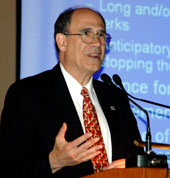 |
| Dr Mark Hallet speaks at the neurology symposium |
It can start off as a cramp on your wrists or a sudden stiffening of the neck. It might even twist a child’s body and force an otherwise normal adult to walk with bizarre, jerky movements. Brain scientists have of late begun making strides in understanding and treating this ailment called dystonia, a neurological condition which causes involuntary muscle contractions that interfere with basic movements of the body.
“Dystonia helps us understand how the brain functions even in normal situations, such as how people make movements,” said Dr Mark Hallet, a senior investigator at the Human Motor Control section of the National Institute of Neurological Disorders and Stroke (NINDS), US. He was speaking at a symposium organised by the Bangur Institute of Neurology at the Oberoi Grand last week.
According to Hallet, scientists have found 15 dystonia-related genes (DYT1 to DYT15) and are working to sort out what goes wrong in those genes. “The DYT1, located on the human chromosome 9, is the main culprit,” he said. “Mutation in the gene leads to an altered ability to learn specific movements. The mutated gene produces an abnormal version of a protein called torsin A, which disrupts communication among the neurons, responsible for movement and muscle control.”
Among the promising treatments of dystonia are injections of a poison called botulinum toxin (Botox) to block muscle spasms and surgery to alter brain centres that cause abnormal movements. Some patients also respond to physical therapy to reduce and eliminate muscle spasms.
According to Hallet, dystonia may also occur in association with untreated Parkinson’s disease (PD), which remains largely unrecognised and misdiagnosed in India.
Although PD is a major cause of movement disorder in the elderly in this country, it has not been studied in depth at the genetic level until recently. Dr Jharna Ray, a professor at the S.N. Pradhan Centre for Neurosciences, Calcutta, presented her research at identifying the molecular pathway of the disease in Indians. After having studied 138 patients, she has identified five mutations which are specific to Indians suffering from the disease.
Dr Shyamal Das, a professor of neurology at the SSKM Hospital, presented comprehensive epidemiological studies on movement disorders on the ethnic diaspora of Calcutta. Surprisingly the study found a higher prevalence of dystonia compared to Parkinsonism. “However, our study indicates strong effects of environment and lifestyle changes on movement disorders,” said Das.











